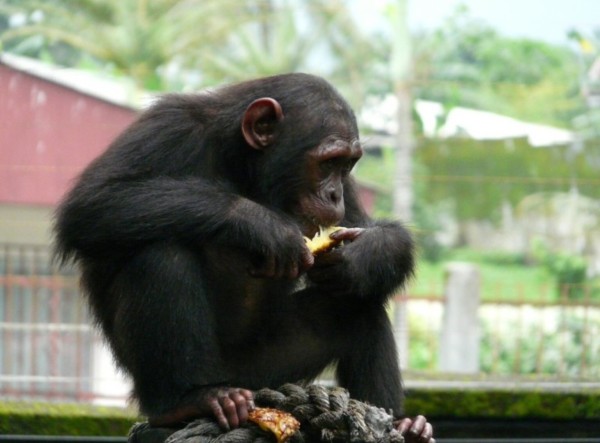One of the most endangered primates, and the most endangered chimpanzee subspecies in the world — the Nigeria-Cameroon Chimpanzee (Pan troglodytes ellioti) — is likely to see its numbers plummet over the coming years, according to new research published in BMC Evolutionary Biology.
As it stands currently, there are around ~6,000 individuals of this subspecies left in the wild. The subspecies has seen its numbers fall in recent years due to deforestation, expanding agriculture and human settlements, and illegal poaching and bushmeat hunting. What the new research has found, though, is that these issues will be greatly exacerbated by climate change in the coming years.
Researcher Paul Sesink Clee, Graduate Research Fellow at Drexel University, stated: “The Nigeria-Cameroon chimpanzee is perhaps the least studied of all chimpanzee subspecies. This is the first time that their distribution and habitat has been studied in such detail, and the data used to predict how their habitats might alter under climate change. We were surprised to see that the Nigeria-Cameroon chimpanzees living in the savanna-woodland habitat of central Cameroon are under the most immediate threat of climate change, and may completely lose their habitat within our lifetime.”
Here’s an explanation of the methodology used in the study:
The research team, one of the few groups studying Nigeria-Cameroon chimpanzees in the wild, mapped their precise geographic locations using reports of sightings, evidence of activity including nests and tools, and fecal and hair samples collected for genetic analyses.
In the most detail to date, they mapped the distribution of two distinct populations of P. t. ellioti — those in the mountainous rainforests of western Cameroon, and those in central Cameroon where three distinct habitats converge to form a mosaic of forest-woodland-savanna. These fragile mosaics of ecosystems (or ‘ecotones’) are thought to be important in driving variation and diversification of species all over the world.
They combined this population data with the environmental characteristics of their locations (including climate, slope, vegetation and tree cover) to determine how habitat drives the distribution of the Nigeria-Cameroon Chimpanzee. They then predicted how these habitats would change under climate change scenarios for years 2020, 2050, and 2080. The scenarios were provided by the UN’s Intergovernmental Panel on Climate Change and considered a varying range of factors including use of fossil and non-fossil fuels, human population growth, and environmental protection efforts.
According to this approach — the mountainous rainforest habitat isn’t expected to decline too much, the ecotone habitat of the second population is predicted to crash and burn rather quickly (under all scenarios by the year 2020). Said ecotone habitat could disappear completely before 2080, according to the work — worth remembering is that half of the subspecies lives in the ecotone habitat of central Cameroon.
Of course, worth mentioning here is that chimpanzees are really rather smart — they may very well ‘adapt’ to their changing environment to some degree, or could simply move. The real issue with regards to the continuing survival of the subspecies (to my eyes) is continued illegal poaching, bushmeat hunting, and deforestation — all of which have had profound effects on the subspecies, and the broader species.
For more information, see: 25 Most Endangered Primate Species List Released
Image Credit: Drexel University
